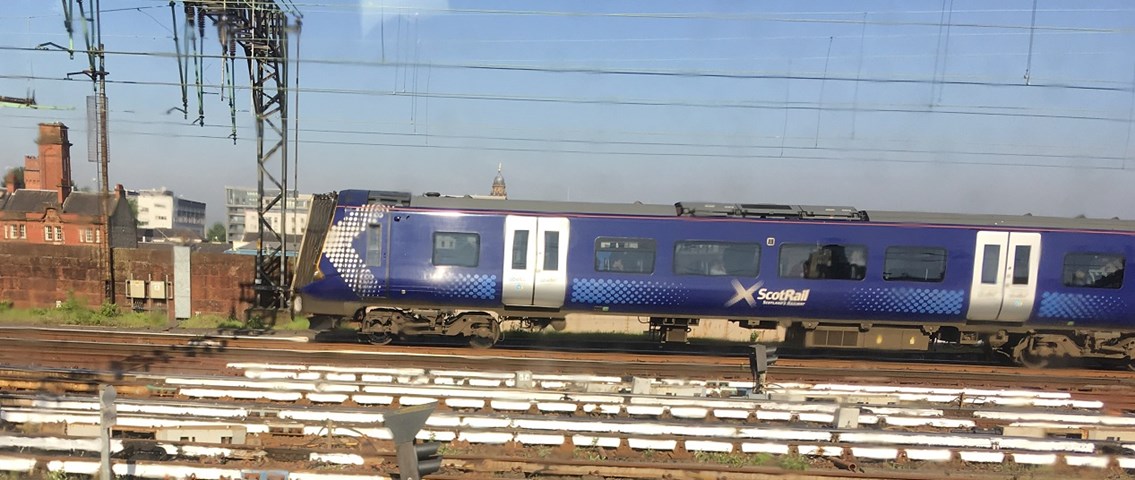Friday 3 Aug 2018
Extreme rail temperatures affect performance
- Region & Route:
- Scotland’s Railway: Scotland
Scotland’s railway has faced a challenging period with extreme rail temperatures and track and signalling faults delaying trains.
On Thursday 28 June 2018, rail temperatures across Scotland topped 50 degrees Celsius, which forced Network Rail to impose speed restrictions across Scotland’s rail network to prevent tracks buckling. Running trains at lower speeds reduces the risk of trains derailing.
Network Rail Scotland and ScotRail are conducting a hot-weather review, to learn the lessons of recent weeks.
Network Rail engineers faced a challenging period as several signalling faults across the network, predominantly around Glasgow, disrupted customers. In response to specific failures around Glasgow, Network Rail Scotland is spending an extra £5m on the reliability of the track and signalling over the next 8 months to improve services for customers.
The industry standard public performance measure (PPM) - trains that arrive within five minutes of their scheduled time, having stopped at all scheduled stations – for the four-week period to 21 July 2018 records 85.5 per cent of ScotRail trains meeting their target.
|
Performance on Scotland’s railway (subject to revision) |
||
|
Caused by |
PPM Failures* |
Target |
|
Network Rail Scotland |
5577 |
2378 |
|
ScotRail |
2317 |
1660 |
|
Other train companies impact on ScotRail |
429 |
353 |
|
Unattributed |
335 |
136 |
*PPM Failures is the number of trains that were delayed or cancelled.
Despite these challenges, more than four out of five ScotRail trains reached their destinations within their targeted arrival time. In a four-week period ScotRail runs, on average, 59,600 trains.
ScotRail’s moving annual average - the average performance for the year to 21 July 2018 – is 88.4 per cent.
Last week, ScotRail introduced the first of its brand-new Hitachi Class 385 trains on the Edinburgh to Glasgow via Falkirk High route. The new electric trains deliver faster journeys, more seats and are more reliable than the diesel trains they replace. This transformation for customers follows Network Rail’s electrification of the Edinburgh to Glasgow via Falkirk High route.
The ScotRail Alliance, a partnership between Network Rail Scotland and ScotRail, is working with railway expert Nick Donovan to improve track and train reliability. Following a review, he made 20 recommendations to improve performance on Scotland’s railway and is now working with the teams to implement them. Progress has been made in several areas.
So far, this has:
- Banned skip-stopping, except as a last resort;
- Agreed a £12m plan to reduce the impact of Autumn weather on performance;
- Improved punctuality of trains to and from Whifflet by turning trains round closer to Whifflet station.
Alex Hynes, Managing Director of the ScotRail Alliance – a partnership between ScotRail and Network Rail Scotland - said:
“I’m sorry to our customers who have experienced disruption recently due to the problems with track and signals. This, combined with the extremely hot rail temperatures, meant our performance has simply not been good enough.
“Customers expect a reliable service and my teams in Network Rail Scotland and ScotRail are determined to give them that.”
Contact information
Passengers / community members
Network Rail national helpline
03457 11 41 41
Latest travel advice
Please visit National Rail Enquiries
Journalists
Network Rail press office - Nick King
Media relations manager (Scotland)
0141 555 4108 / 07515 617073
nick.king3@networkrail.co.uk
About Network Rail
We own, operate and develop Britain's railway infrastructure; that's 20,000 miles of track, 30,000 bridges, tunnels and viaducts and the thousands of signals, level crossings and stations. We run 20 of the UK's largest stations while all the others, over 2,500, are run by the country's train operating companies.
Usually, there are almost five million journeys made in the UK and over 600 freight trains run on the network. People depend on Britain's railway for their daily commute, to visit friends and loved ones and to get them home safe every day. Our role is to deliver a safe and reliable railway, so we carefully manage and deliver thousands of projects every year that form part of the multi-billion pound Railway Upgrade Plan, to grow and expand the nation's railway network to respond to the tremendous growth and demand the railway has experienced - a doubling of passenger journeys over the past 20 years.
Follow us on Twitter: @networkrail
Visit our online newsroom: www.networkrailmediacentre.co.uk

